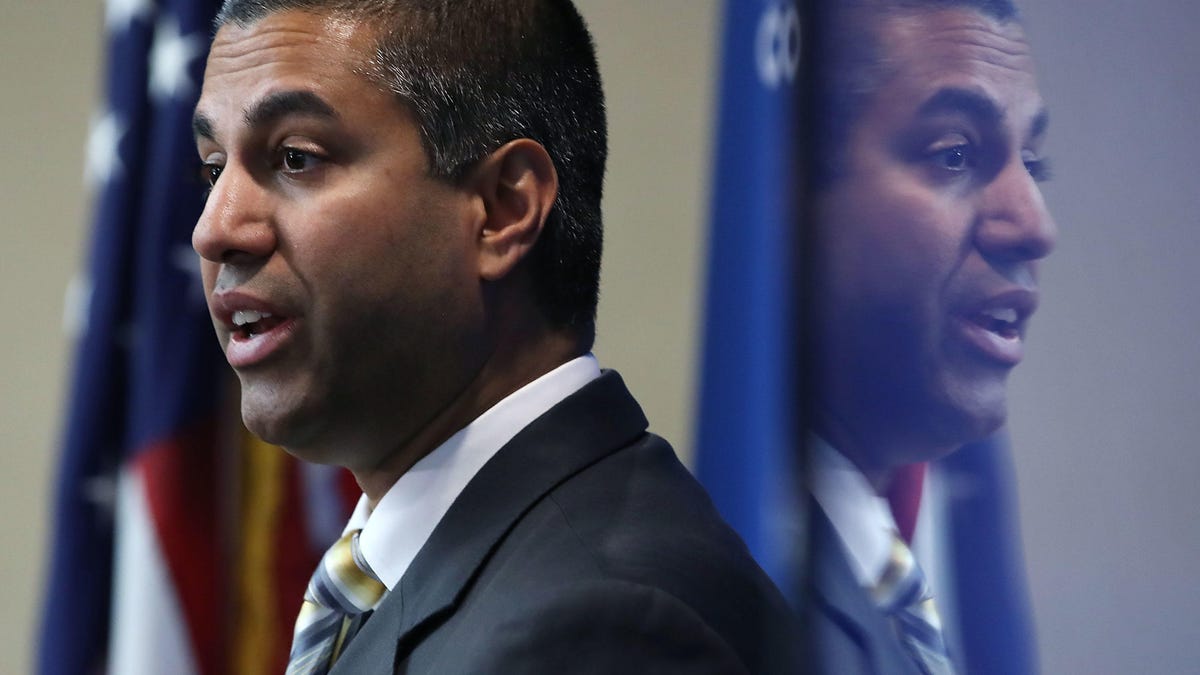FCC proposal to fight robocalls gives carriers, and you, more power
The plan pitched by Ajit Pai would let everyone block unwanted calls by default.

FCC Chairman Ajit Pai will reportedly crack down on illegal robocalls on Wednesday.
FCC Chairman Ajit Pai wants to give mobile phone companies greater power to block unwanted robocalls.
Pai's proposal, if adopted, would allow wireless carriers to block those robocalls for customers by default. Companies would also allow consumers to block calls from unknown numbers themselves. According to a Wednesday release from the Federal Communications Commission, customers can opt into or out of any blocking services.
"Allowing call blocking by default could be a big benefit for consumers who are sick and tired of robocalls. By making it clear that such call blocking is allowed, the FCC will give voice service providers the legal certainty they need to block unwanted calls from the outset so that consumers never have to get them," Pai said in the press release.
Pai also proposed seeking public comment on how caller ID authentication standards, otherwise known as Shaken/Stir, could inform call blocking. The Shaken/Stir framework would validate where calls originate and where they claim to be coming from, and would allow for faster tracing of illegal calls to find out who's responsible for them.
Congress expressed frustration with illegal robocalls in April and reintroduced bipartisan legislation called the Telephone Robocall Abuse Criminal Enforcement and Defense Act (aka the Traced Act). The bill would improve enforcement policies, criminalize illegal robocalling, and require phone companies to use a new technology that can validate that calls are originating where they claim to be coming from. In addition, the protocol would allow for faster tracing of illegal robocalls.
The number of unwanted robocalls skyrocketed 46% from 2017 to 2018. A January report from Hiya, a caller ID service, said there were 26.3 billion robocalls made in the US in 2018. The number breaks down to an average of 10 monthly calls per person.
The major US wireless carriers and cable giant Comcast, which also provides mobile phone service, applauded the FCC's "aggressive steps." AT&T said in a statement that it fully supports the FCC's effort to allow wireless carriers to "increase the arsenenal of tools available to combat calls" that come from suspected robocallers.
Comcast said in its statement that it's great news for consumers that wireless carriers will now be able to implement a default setting to block unwanted calls.
"We will have another tool that will permit us to protect our customers by stopping illegal robocalls before they reach our customers' phones," said Eric Schaefer, a senior vice president at Comcast.
But the providers also acknowledged that these actions alone won't stop the scourge of robocalls.
"As the FCC warns, however, there is no silver bullet in this war as scammers continue to find new ways to reach unsuspecting consumers," said Joan Marsh, executive vice president at AT&T said.
At least one FCC commissioner is not convinced that Chairman Pai's approach is prudent. On Wednesday, Pai and the four FCC commissioners testified before a US House of Representatives oversight committee, where they addressed concerns about what the agency is doing to curb the growing number of robocalls. In his prepared testimony at the hearing, O'Rielly noted that it was important to take a "careful and nuanced" approach. O'Rielly has traditionally been an outspoken supporter of legitimate businesses that use robocalls. And he has opposed efforts that would put up barriers for companies using autodialers.
"Not all robocalls are illegal or scams, and we must be precise in describing the actual problem at issue," he said in the statement. "Many honest, legitimate businesses use automatic dialing technologies to communicate needed information to their customers and doing so is perfectly within the scope and intent of the TCPA [Telephone Consumer Protection Act]."
He went on to say that, "These legal and legitimate calls and texts share no part in the true robocall problem facing the nation's communications networks."
The FCC is expected to vote to open up Pai's proposal for public comment at its June 6 meeting.
Originally published May 15 at 5:36 a.m. PT.
Update at 6:01 a.m. PT: Adds info from FCC release.
Update at 6:29 a.m. PT: Adds background on SHAKEN/STIR.
Update at 11:53 a.m. PT: Adds comments from AT&T, Comcast and Com. Michael O'Rielly.



